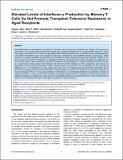| dc.contributor.author | Kim, James I. | en_US |
| dc.contributor.author | Stott, Ryan T. | en_US |
| dc.contributor.author | Soohoo, Julie | en_US |
| dc.contributor.author | Lee, Kang Mi | en_US |
| dc.contributor.author | Zhao, Gaoping | en_US |
| dc.contributor.author | Yeh, Heidi | en_US |
| dc.contributor.author | Deng, Shaoping | en_US |
| dc.contributor.author | Markmann, James F. | en_US |
| dc.date.accessioned | 2014-03-11T10:17:09Z | |
| dc.date.issued | 2013 | en_US |
| dc.identifier.citation | Kim, James I., Ryan T. Stott, Julie Soohoo, Kang Mi Lee, Gaoping Zhao, Heidi Yeh, Shaoping Deng, and James F. Markmann. 2013. “Elevated Levels of Interferon-γ Production by Memory T Cells Do Not Promote Transplant Tolerance Resistance in Aged Recipients.” PLoS ONE 8 (12): e82856. doi:10.1371/journal.pone.0082856. http://dx.doi.org/10.1371/journal.pone.0082856. | en |
| dc.identifier.issn | 1932-6203 | en |
| dc.identifier.uri | http://nrs.harvard.edu/urn-3:HUL.InstRepos:11879347 | |
| dc.description.abstract | Immunosenescence predisposes the elderly to infectious and autoimmune diseases and impairs the response to vaccination. We recently demonstrated that ageing also impedes development of transplantation tolerance. Unlike their young counterparts (8-12 weeks of age) aged male recipients (greater than 12 months of age) transplanted with a full MHC-mismatched heart are resistant to tolerance mediated by anti-CD45RB antibody. Surprisingly, either chemical or surgical castration restored tolerance induction to levels observed using young recipients. Based on the strong impact of endocrine modulation on transplant tolerance, we explored the impact of ageing and castration on the immune system. Here we report a significant increase in the percentage of T cells that produce interferon-γ (IFN-γ) in aged male versus young male animals and that the overall increase in IFN-γ production was due to an expansion of IFN-γ-producing memory T cells in aged animals. In contrast to IFN-γ production, we did not observe differences in IL-10 expression in young versus old male mice. We hypothesized that endocrine modulation would diminish the elevated levels of IFN-γ production in aged recipients, however, we observed no significant reduction in the percentage of IFN-γ+ T cells upon castration. Furthermore, we neutralized interferon-γ by antibody and did not observe an effect on graft survival. We conclude that while elevated levels of interferon-γ serves as a marker of tolerance resistance in aged mice, other as yet to be identified factors are responsible for its cause. Defining these factors may be relevant to design of tolerogenic strategies for aged recipients. | en |
| dc.language.iso | en_US | en |
| dc.publisher | Public Library of Science | en |
| dc.relation.isversionof | doi:10.1371/journal.pone.0082856 | en |
| dc.relation.hasversion | http://www.ncbi.nlm.nih.gov/pmc/articles/PMC3858330/pdf/ | en |
| dash.license | LAA | en_US |
| dc.title | Elevated Levels of Interferon-γ Production by Memory T Cells Do Not Promote Transplant Tolerance Resistance in Aged Recipients | en |
| dc.type | Journal Article | en_US |
| dc.description.version | Version of Record | en |
| dc.relation.journal | PLoS ONE | en |
| dash.depositing.author | Kim, James I. | en_US |
| dc.date.available | 2014-03-11T10:17:09Z | |
| dc.identifier.doi | 10.1371/journal.pone.0082856 | * |
| dash.contributor.affiliated | Kim, James | |
| dash.contributor.affiliated | Deng, Shaoping | |
| dash.contributor.affiliated | Markmann, James | |
| dash.contributor.affiliated | Yeh, Heidi | |


